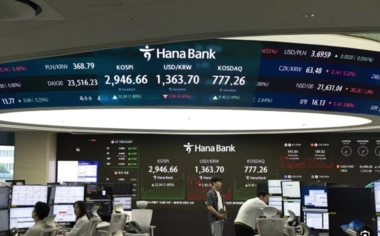
Bangkok – Saba:
Asian stock markets showed a mixed performance on Monday, beginning the new week after Wall Street posted its third consecutive weekly gain last week.
In Japan, the stock market was closed for a public holiday. The closure came a day after the ruling coalition lost its majority in both the House of Representatives and the Senate for the first time since 1955. The defeat in Sunday’s elections follows the earlier loss of its majority in the lower house last October.
Despite the electoral setback, Prime Minister Shigeru Ishiba vowed to remain in office, saying the results reflect growing voter frustration with rising prices and ongoing political instability.
In China, the Shanghai Composite Index rose 0.4% to 3,549.89 points, while Hong Kong’s Hang Seng Index edged up 0.3% to 24,895.20 points. The gains came after the People’s Bank of China (PBOC) decided to keep key interest rates for one-year and five-year loans unchanged.
Recent strong economic data from China helped ease pressure on policymakers to loosen credit conditions further.
Meanwhile, the administration of U.S. President Donald Trump softened its rhetoric toward Beijing, contributing to progress in trade talks and helping the two sides avoid significant tariff hikes on Chinese exports to the U.S.
In South Korea, the Kospi rose 0.5% to 3,205.71 points, supported by a slight improvement in export figures reported for the previous month.
In contrast, Australia’s S&P/ASX 200 index fell 1.1% to 8,659.50 points.
Elsewhere, Taiwan’s TAIEX slipped 0.3%, India’s Sensex (SENEX) rose 0.2%, and Thailand’s SET index declined.
Asian stock markets showed a mixed performance on Monday, beginning the new week after Wall Street posted its third consecutive weekly gain last week.
In Japan, the stock market was closed for a public holiday. The closure came a day after the ruling coalition lost its majority in both the House of Representatives and the Senate for the first time since 1955. The defeat in Sunday’s elections follows the earlier loss of its majority in the lower house last October.
Despite the electoral setback, Prime Minister Shigeru Ishiba vowed to remain in office, saying the results reflect growing voter frustration with rising prices and ongoing political instability.
In China, the Shanghai Composite Index rose 0.4% to 3,549.89 points, while Hong Kong’s Hang Seng Index edged up 0.3% to 24,895.20 points. The gains came after the People’s Bank of China (PBOC) decided to keep key interest rates for one-year and five-year loans unchanged.
Recent strong economic data from China helped ease pressure on policymakers to loosen credit conditions further.
Meanwhile, the administration of U.S. President Donald Trump softened its rhetoric toward Beijing, contributing to progress in trade talks and helping the two sides avoid significant tariff hikes on Chinese exports to the U.S.
In South Korea, the Kospi rose 0.5% to 3,205.71 points, supported by a slight improvement in export figures reported for the previous month.
In contrast, Australia’s S&P/ASX 200 index fell 1.1% to 8,659.50 points.
Elsewhere, Taiwan’s TAIEX slipped 0.3%, India’s Sensex (SENEX) rose 0.2%, and Thailand’s SET index declined.